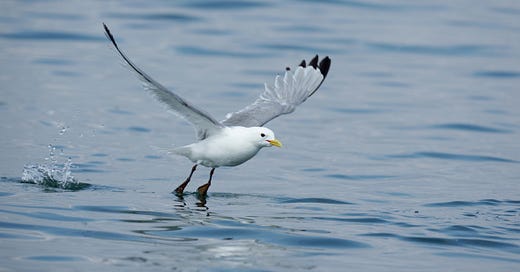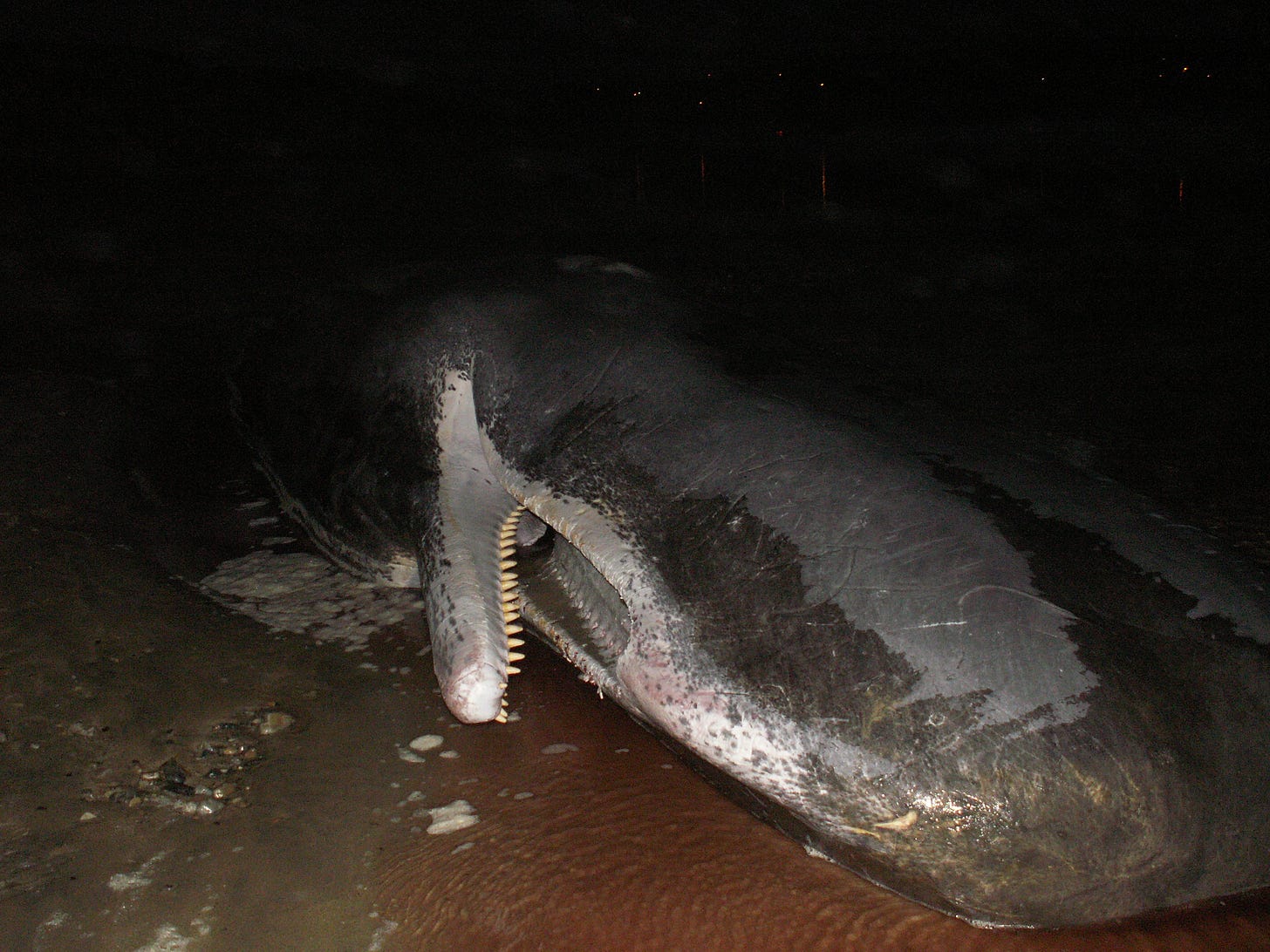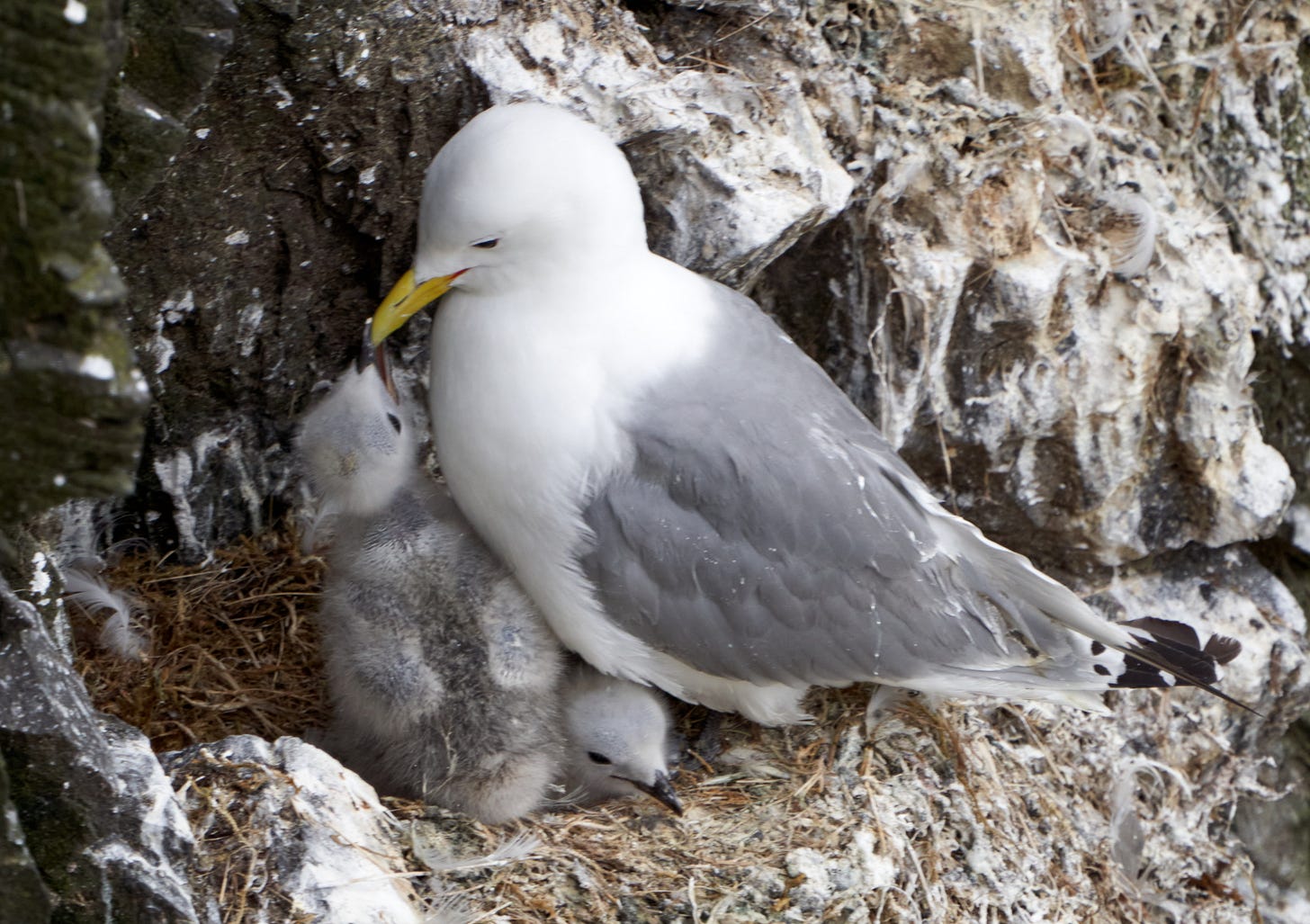As a child I never once thought of running away to sea. It wasn’t that I lacked curiosity. For years the rockpools of middle tide on the Gower peninsula held me captive the summer long. All boyish skin and bone, I gawked around them like a hungry dog waiting for the next scrap of miracle. The green barnacled pebble that sprouted legs and walked away. The jewelled shrimp which flicked in and out of invisibility. The dried-blood red anemones that embraced my fingertip and were so loath to release me.
But down below the zone of middle tide I dared not go. There lay terror. The slurping slop sway of the kelp forests at low water concealed the dreadful truth that flesh rots and stomachs bloat.
No, I was not a child of the sea. The seagulls knew it, wheeling and wooing, calling me to join them. They knew I was born to the air and my nightly dreams of flight soon merged into the reality of airspeed and side-slip, altitude and mach number. For decades my world was upside down. I didn’t leave the ground to go up. Rather, I came down, on occasion, to sleep, to refuel, sometimes to re-arm. Thousands upon thousands of hours on the wing in pretty much anything that would get off the ground.
One day all that was done. The best stories have endings. The hourglass of life turned so that the sand could flow back whence it had come. My world was back the right way up. And there, after all those years, was the patient ocean, biding its time. Watching me walk the strand of northwest Donegal, turning over the piles of drift to find some clue to the strangeness that lives in water. But still always holding back, a stranger on the outside, peering in through the ever-shifting window of the sea.
Until I met the boatman. His scraggle-taggle beauty, much admired by women and seals, shone even in the failing light. A touch of red in his unruly hair, almost bleached away by the sun. The tell-tale lilting of the final ‘l’ sounds when he said words like ‘smile’ or ‘trial’ whispered like a summer breeze from the Tyrone home of his ancestors. His skin and his tears crackled with salt. He had come to pay his respects to his neighbour, laid out before burial, as is the way in these parts. A sperm whale. A juvenile on the cusp of adulthood.
Only the two of us and the whale on these many miles of dune-backed sand, facing north to Tory. The great doorstop of a corpse had come ashore out of sight of habitation, on the late afternoon high tide. There would be a night of peace and respect before the circus arrived. I am here by chance, if there is such a thing. The boatman? Perhaps he had already passed the whale’s body lolling in the open ocean and could calculate with the precision of craftsmanship where and when landfall would occur. Perhaps the sea, like the parish priest, had had a quiet word and told him that his presence was required.
He stands relaxed. Death is not formal in these coastal communities. His sinews listen intently for the shifting of the sand, expecting the rise and fall of a gentle swell. Then the boatman reaches out and runs his fingers tenderly over the hieroglyphs on the whale’s skin, reading them like braille. Etched into the surface of the great battering ram of the youngster’s head there are swirling patterns of little circles, each a centimetre or two across. ‘These are the marks of mighty squid, many thousands of feet down in the dark. The whale has lived. Oh, how he has lived.’ His voice catches in his throat and he can say no more. It isn’t clear if the boatman is speaking to me or to the ocean or is intoning a secret ceremony which only he and his kind still know. I say nothing. For once in my life I have found the right words.
He turns and sets off in the direction of Machaire Rabhartaigh pier and I wonder if he even knows I am there. Then he stops and faces towards me. ‘I’ll be leaving the harbour at Bun an Inbhir in the morning, about an hour after the tide.’ I nod and ask no questions.
So it was that I finally ran away to sea. Just for a day. Or was it a year and a day? Time is a crooked mile in the northwest of Donegal. When I returned I wrote up my journal. It still makes me smile. It still makes me ache, a little, somewhere deep inside. It still makes me grateful. Here is what I wrote.
Perhaps there is nowhere left to go where the great shadow does not follow. Not any longer. Now that the way things are going is so clear. Even out there on the ocean, away from the busy land. We were far out today. Beyond the shield of islands that muster in defence of the Donegal coast from Cnoc Fola to An Clochán Liath. There was only the endless ahead of us. Out to the fish in a small boat on a choppy sea, my helpless self just ripe for the drowning and a seafaring man whose name is trust and whose soul, if any can be, is still as light as thistle-down.
I wanted away from the taint of knowing. So I took as little as possible on board and amongst my next-to-nothings all the magic charms I could muster. I had tied up the feathers and traces fresh that morning with the silver hooks my grandfather had left me in old tobacco tins, still in the grease-paper, untarnished. They had been protected all these years from corrosion and the news of how things had turned out for us. So that they might still have some luck. I looked for a piece of rusted iron near the jetty and found one that fitted a hand like it was born for it, with a good thump for the killing. A dented flask of rough coffee. An old bucket for the catch.
We caught fish easily. Fine pollock. Travelling mackerel on the small side. The biggest fish went back as gently as we could and us scolding them not to be caught again. The small fish went back quickly and away my lads and lasses. Those in between we took. We talked, as our species does, but stopped often in the middle of a sentence, for a fish or a bird or just for the stopping, and never picked up where we left off. Shearwaters passed just to seaward. The giant swifts of the open ocean. The original vessels of flight from which all other flight has been decanted. We both see them. We both see that the other has seen them, and are silent.
I try to learn things from him by watching. How his knife respects the backbone and the ribs to make a fillet just so. How he looks at things and sees and moves on. How he doesn’t mind. How he greets each wave in the infinite ocean as an individual, with its own face and its particular ambition. These and many other things I might learn by watching.
But not his closing ceremony, as he prepares to turn and return to the land. The giving back. This is his alone and cannot be replicated, only witnessed. Perhaps each man or woman has their signature way of giving, whether they know it yet or have still to find it. We have stopped fishing because we have enough fish. For our tables and for neighbours. For the old men who no longer go to the sea and for the old women whose men are in the sea. He gives back what we do not require – heads and guts, some livers and tails. He gives to the black-back and the herring gulls. To a young brown gannet down on his luck. But with a hidden smile he raises his arm, looks away as if he is shy, and gives the best and richest to the kittiwakes hovering above his head. The kittiwakes. So close and so delicate as if you dreamed you were a bird and took a lover. He knows just where the chicks are waiting on the Tory Island cliffs and imagines them full and fat and lolling asleep tonight. He dreams, briefly, that he is a bird. I dream for an instant that I am a man of the sea.







I could hear the ocean in your voice, David. The words gently washing up in waves and then the subtle rumbling of small pebbles as the waters pulled back from the shore. I have never fished for pollock but have watched them swim about my feet as I floated in gelid Scottish waters and when I look for a piece of iron near an old harbour it is usually with the intent of wrapping it in silk and seaweed in the hope of imprinting the former with the magic of the latter. Though I live two hours from the coast, I love the sea and have a feeling that the 2% Irish that shows up in my DNA was gifted me by a selkie ancestor (who was probably a fine storyteller too). All of which is just a very long-winded way of saying thank you for another beautiful telling.
I am absolutely transported by your writing. And what a delight to hear you read the words. I have been unintentionally absent from your beautiful corner of Substack since "The ghost with a bucket that sings," and am so excited to realize how many pieces of yours I have yet to read. I will ration them to myself like holiday chocolates.